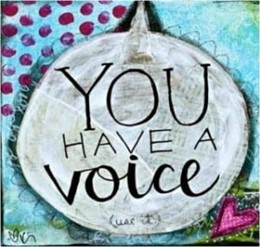#WomenEd Blogs
Finding our voice
by Jackie Hill @hill1_jackie
Losing your voice
“I’ve lost my voice - again” – it kept happening for 2 years. At first, it was funny (sort of) but that changed, as it could take weeks for it to return fully. I tried different treatments, but nothing worked permanently.
My GP said the best treatment was simply not to talk!! Well, I found that practically impossible...! I learned just how dependent I am on my voice and how, without it, I felt disempowered and left out.
Eventually she said 'We need to try a different approach' and her lateral thinking turned out to be inspired. It has meant that thankfully my voice hasn’t disappeared since then.
Nevertheless, those times of enforced silence left their mark, spurring me to reflect more deeply on how vitally important our voices (in every sense) are – and what it can mean to lose them, or perhaps never to really find them in the first place.
In her autobiography, Becoming, Michelle Obama recounts how, as a 10 year-old, a cousin asked her: 'how come you talk like a white girl?' She couldn’t answer. It was the first time that she realised that the way she spoke was different, and she couldn’t say why. Reflecting on her inability to explain, she says 'I realise that I was a long way still from finding my voice'…
Searching for your voice
Finding your voice can clearly take some time. She later affirms: 'If there’s one thing I’ve learned in life, it’s the power of using your voice.' She exemplifies how finding, and using, your voice can empower you to speak up not just for yourself but for others too.
At the launch of @WomenEdEngland, I loved the focus on new voices. Some really challenged and inspired me, particularly The Quiet One who found her voice @GeraldineOnek - her story and achievements are amazing, as is her call to 'Step up, stand up and shout!'
As a painfully shy child, and then an adult plagued by the voice of my inner critic, I’ve written previously about how #WomenEd helped me to finally identify and find strategies to silence that negative inner voice.
Sometimes, it’s other people who cause us to doubt ourselves so we hold back from speaking up and speaking out. 'You can’t say that!' is such a loaded phrase - the meaning can change depending on which word is emphasized. It’s not just what, but how, something is said. Maya Angelou’s words are so true: 'I may forget what you’ve said – but I’ll remember how you made me feel.'
Finding and using your voice
Instead of wasting time listening to our critics, we should rather focus on positive strategies to find our voices and use them with confidence, eg:
- Grow and nurture your own authentic voice
- What is important? What is important to you? ( as a teacher/ educator / leader etc) Why do you think it matters?
- Where can you find others to talk about this, who will listen, who will support or even challenge your views, and who will help to develop your attitude, understanding, skills and knowledge?
- Through all of this, you grow in confidence. When you have established your moral purpose (what you believe is right and fair and important) you can then speak with authenticity and authority.
The importance of community
Within a community (like WomenEd), you can find support, encouragement and opportunities to develop and use your voice, eg: #WomenEd encourages us to Tweet, to present at unconferences, to write blogs, to engage with other networks (eg LGBTEd, BAMEed, DisabilityEd, etc) and ways to support and coach one another. How could you use your voice with learners, colleagues and family and help them to find and use their voices too?
Consider how and when you can best use your voice – be #10%braver and grasp opportunities to speak up and to speak out.
Voices @WomenEdNI
Finally, a word about the power of our collective Voice. For our @WomenEdNI Showcase (at the Global Unconference), we, @marylowery1 @ThompsonMaire @MaireadMhigUaid and I, chose the following title: Becoming a unified and influential voice for change. You can find the recording of our @WomenEdNI “Showcase” on the #WomenEd YouTube channel.

We have combined our voices, from different settings and backgrounds, to work on becoming that 'voice for change'. We are supported and encouraged by many other voices from our wider networks and indeed across the #WomenEd global community.
We do still have much to do but, together, we know that our voices can make a difference: the sound of our voices together is truly empowering and uplifting.
When you subscribe to the blog, we will send you an e-mail when there are new updates on the site so you wouldn't miss them.

Comments